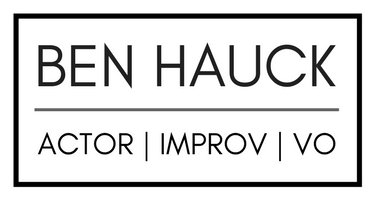Interests
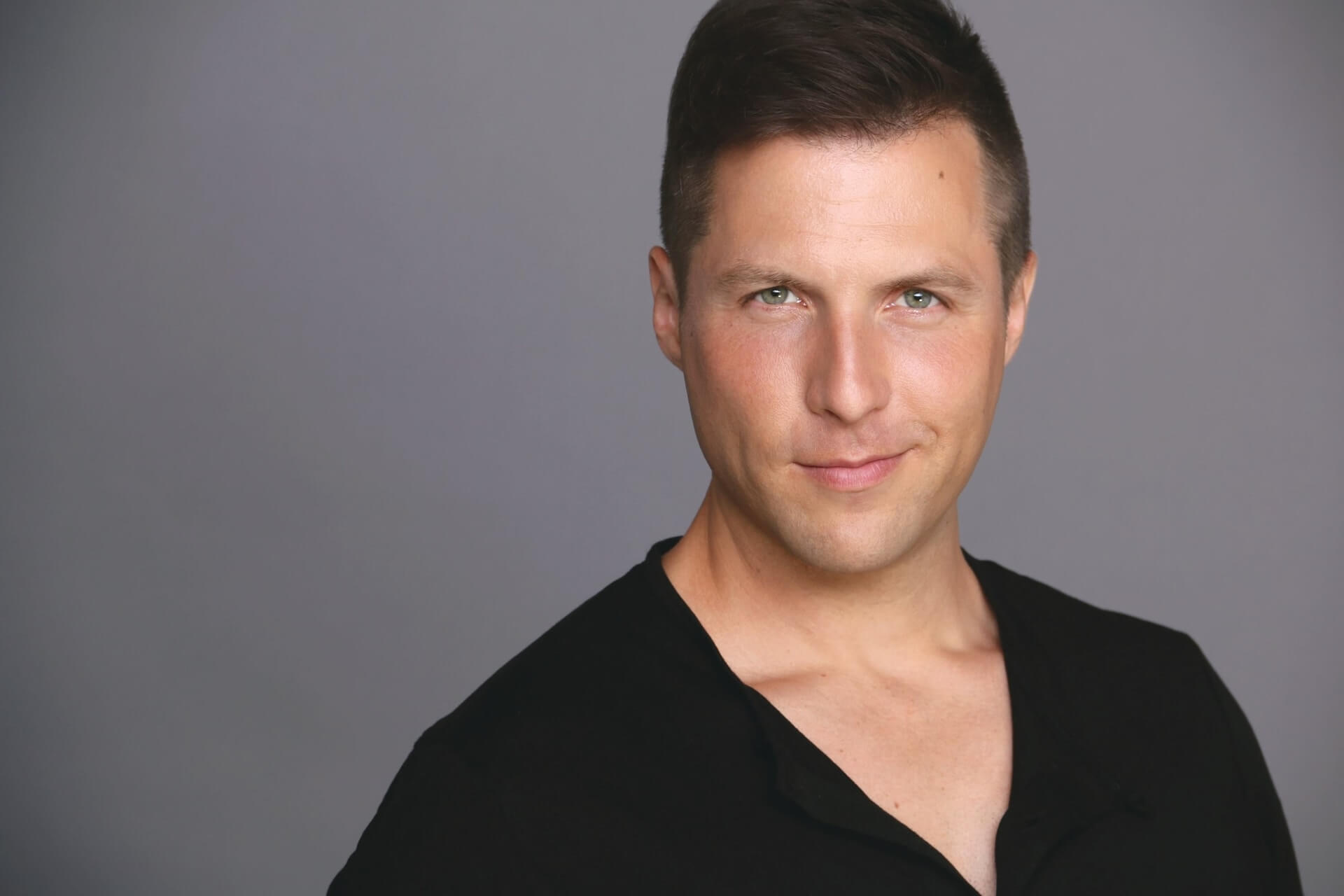
In addition to acting and writing, there are a few other interests to which I dedicate my energy.
Here are a few of those interests.
Click on the tab headings for information on my other interests.
Improv Teaching
After years of coaching an improv team, in 2007 I was approached to create a custom improv training program for a corporate client. The program taught the company’s multinational software engineers how to perform improvised scenes for an audience. The training translated well to their work and helped built the corporate culture. The program culminated in a public improv performance by the company’s employees.
The first custom improv program was a hit, and it quickly expanded. Over the years, I’ve taught improv in New York City, Toronto, and London. While teaching has primarily focused on long-form scenic improv, I have also taught musical improv — to non-singers!
Improv brings employees together to creatively solve problems in high-pressure and demanding environments, under the guise of having a hilarious time. If you’d like to hire me to train your employees in improvisation, get in touch!
Marathon Running
In 2001, I ran my first marathon: the New York City Marathon.
Since then, I’ve run 14 official marathons, participating in the NYC Marathon six times, the Philadelphia Marathon five times, and the Boston Marathon twice. I’ve qualified for the Boston Marathon three times.
My PR is 3:07:32, which I achieved in Philadelphia in 2009. I ran my most recent marathon in 2017 in 3:17:59.
O’er the Hills: My Running Blog
I keep a blog about the races I do, whether they be marathons or shorter distances.
If you want insights into running a marathon — or if you’d like insight into what’s it’s like simply running a race in Central Park — give my running blog a read. My blog includes Garmin data of my runs, so you’ll see my routes and my moment-by-moment stats to inform your own runs.
General Semantics: The Study of Science and Sanity
Back in college, I stumbled across a journal titled ETC: A Review of General Semantics. The journal fascinated me with its odd collection of really helpful information. The journal and the books its pointed me to helped me to become versed in the subject of general semantics, a subject that changed not just my writing but also my way of thinking.
General semantics sounds as if it’s about language, but it’s about more than that. How I see it, it’s a practical discipline that applies speaking and writing strategies and modern scientific thinking to solve problems in everyday life. It’s sort of like engineering the brain. It as founded by Alfred Korzybski, whose writings from the first half of the 20th Century still stimulate and astound me in their insights.
The Institute of General Semantics
Soon after discovering general semantics, I quickly became a member of the International Society for General Semantics, then the Institute of General Semantics. Eventually, ISGS and IGS merged to become simply IGS.
For IGS, I not only serve on its board of trustees, but I also volunteer as its webmaster, managing its online store and online persona.
The New York Society for General Semantics
A>fter moving to New York City, I joined the New York Society for General Semantics. NYSGS holds semi-monthly meetings at The Players Club in Gramercy Park on a wide range of topics connected to general semantics and the related field, media ecology.
I also serve on the board of directors of NYSGS.
Off the Map: My Blog about General Semantics
I’ve long written about general semantics, including having some papers published in ETC: A Review of General Semantics. Outside of publications, I’ve used my blog Off the Map: A Blog about General Semantics to work through different ideas within the field of general semantics and explore my shifting interpretations of some of its ideas.
The Acting Income Podcast with Ben Hauck
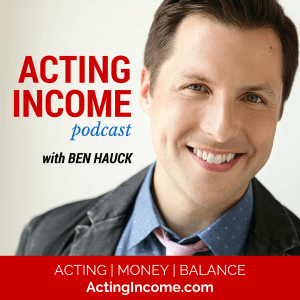 After getting hooked on podcasts, I pulled the trigger in 2015 and founded The Acting Income Podcast. It was a podcast geared toward actors interested in the eternal pursuit of making money, whether that money was earned from acting work or other work.
After getting hooked on podcasts, I pulled the trigger in 2015 and founded The Acting Income Podcast. It was a podcast geared toward actors interested in the eternal pursuit of making money, whether that money was earned from acting work or other work.
In addition to interviews with actors on interesting ways they made money to support their acting careers, the podcast also touched on other serious acting topics that affected actor earning, like collective bargaining agreements, financial core status, and discrimination and sexual abuse.
The podcast was weekly until it became too difficult for me to maintain that publishing schedule, after which point it became flexible in its release schedule. As of late 2017, the podcast is on hiatus, but there are a ton of ideas I’m still interested in covering and I may release an episode at any time.
The Acting Income Podcast is available on Apple Podcasts and simultaneously released on YouTube. The podcast is the main feature of the ActingIncome.com, a website I founded not just to house the podcast but also to be a more expansive resource on acting and income. To date, it serves as a great place to find out what topics are on what podcast episodes.
Artist Interview Series
For a while I’d wanted to interview artists in depth. I’d wanted to see how they thought, how they saw things, how they did things.
One day while meeting up with Mandy May Cheetham, I brought my Flipcam. I asked if I could interview her, and at Shake Shack in Madison Square Park, over some fries with ketchup, I interviewed Mandy.
I continued the project whenever I met interesting people whose artistry I wanted to learn about. I put the extended interviews (complete with intentionally darting camera angles) up on YouTube, and I called them my Artist Interview Series.
Stand-In Central: A Helpful Resource for the TV/Film Stand-In
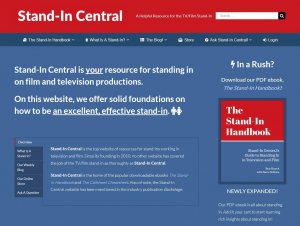 In March 2010, I founded the website Stand-In Central, the first and only website dedicated to providing information about job of the television and film stand-in.
In March 2010, I founded the website Stand-In Central, the first and only website dedicated to providing information about job of the television and film stand-in.
The website, updated every Wednesday night with tips, interviews, and useful information about standing in, has helped people become stand-ins for top actors and top productions.
Stand-In Central has also spun off The Stand-In Handbook, a downloadable ebook that compiles much of the website’s major information on standing in into a portable manual for later reading.
In addition to founder, I also serves as editor of the website, and my work as a stand-in on films and television shows for top actors has informed the friendly, helpful posts in the website’s Tips & Tricks Blog.
Fi-Core Central: The ULTIMATE Resource for Facts about Fi-Core Status
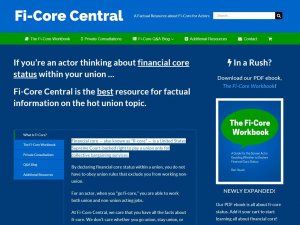 Financial core status — known as “fi-core” in the entertainment industry — is a United States Supreme Court-backed right to pay a union only for collective bargaining services.
Financial core status — known as “fi-core” in the entertainment industry — is a United States Supreme Court-backed right to pay a union only for collective bargaining services.
Discussion of fi-core status stokes controversy in some acting circles, and it’s a topic surrounded by a lot of misinformation. When I was contemplating fi-core, I deeply researched many facets about the status and answered as lot of the questions I had in order to weigh the advantages and disadvantages of going fi-core.
From that research, the website Fi-Core Central was born. The website hosts The Fi-Core Workbook, a downloadable ebook aimed at helping actors weigh what they lose, keep, and gain by declaring financial core status. The book takes an impartial look at fi-core so that actors can better decide for themselves whether fi-core status is right for their acting careers.
In addition to founder, Ben also serves as editor of the website.
